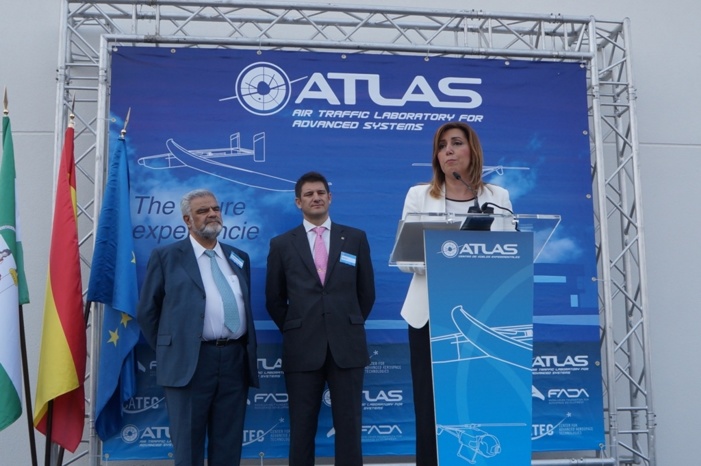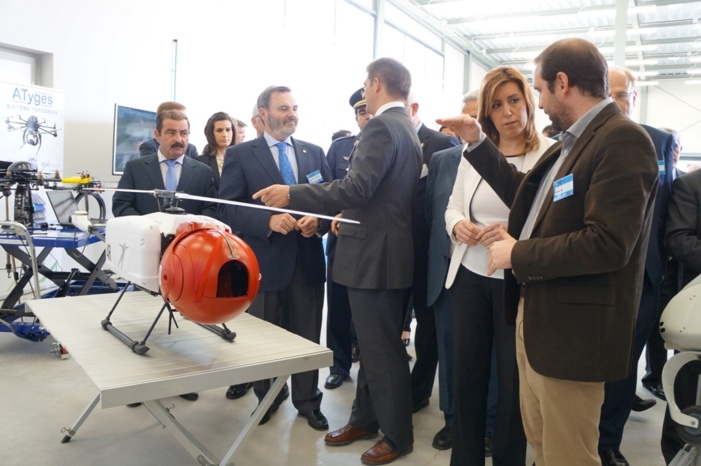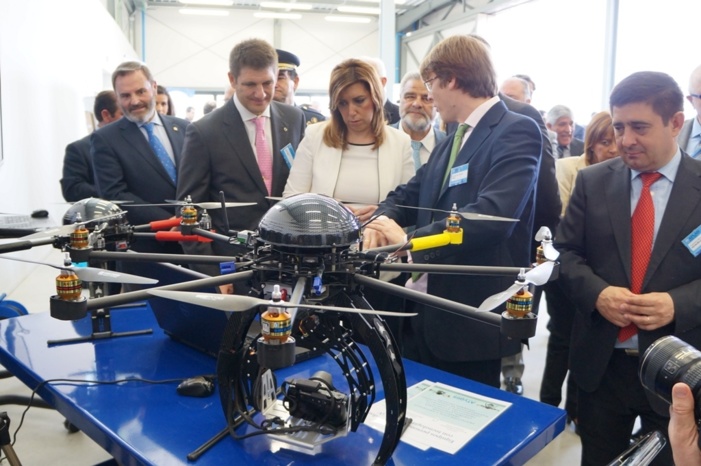PRESS RELEASE
OPENING CEREMONY OF THE ATLAS FLIGHT TEST CENTRE, SPAIN’S FIRST FACILITY DEVOTED TO TESTING UNMANNED AERIAL SYSTEMS
The president of Junta de Andalucía, Susana Díaz, has inaugurated today this facility, fostered by the Andalusian Foundation for Aerospace Development (FADA), and which positions the region at the cutting edge of one of the world’s most promising sub-sectors of the aerospace sphere.
ATLAS (Air Traffic Laboratory for Advanced unmanned Systems) will offer the international aerospace community the first permanent technological-scientific facility to safely perform tests, simulations and validation of technologies to be applied to remotely piloted systems.
The Centre, which is located in the town of Villacarrillo (Jaén), has an aerodrome equipped with premises of excellence and segregated airspace of over 1,000 kilometers, suitable for carrying out unmanned light aircraft system test flight.
ATLAS has already signed agreements of collaboration with important companies and entities within the international aerospace industry such as Boeing to facilitate the use of the facility and carry out testing activities connected to unmanned aerial vehicles.
The ATLAS Centre has involved a total investment of 4.5 million euros, cofunded by the Andalusia ERDF Operational Programme 2007-2013.
Jaén, 21 March 2014.- Andalusia already has Spain’s first facility exclusively devoted to testing technologies and light unmanned aerial vehicles (UAV), also named Remotely Piloted Aircraft Systems (RPAS). The president of Junta de Andalucía, Susana Díaz, has inaugurated today the ATLAS Flight Centre, premises boosted by the Andalusian Foundation for Aerospace Development (FADA), which will offer the international aerospace community the first permanent technological-scientific facility to safely perform tests, simulations and validation of technologies to be applied to this kind of aircraft and its performance in the airspace.
Susana Díaz has stated that ATLAS is the Europe’s first centre specifically designed to research and development activities of this kind of technologies. The president of Junta de Andalucía has pointed out that this is about a strategic project for the Andalusian Aerospace sector, as it will be positioned at the cutting edge of one of the world’s most promising sub-sectors, and which also represents one of the focus for research and development of new military and civil technologies at an international level.
In addition, she has highlighted that it will encourage the industrial activity on UAVs which is increasingly being developed within the region thanks to a variety of enterprises, as well as it will allow incorporate Jaén to the Andalusian aerospace hub, which constitutes today the second Spanish region in terms of turnover and employment within this industry.
In the course of the opening ceremony, Díaz has been accompanied by the regional minister of Economy, Innovation, Science and Employment, José Sánchez Maldonado; the Spanish government representative in Jaén, Juan Lillo; the president of the County Council of Jaén, Francisco Reyes; the mayor of Villacarrillo, Juan Gilabert; the general director of the IDEA Agency and the president of FADA, Antonio Valverde; the general director of FADA-CATEC, Juan Pedro Vela; and the director of the ATLAS Centre, Anastasio Sánchez, as well as a number of Spanish and Andalusian prime aerospace players who joined in to mark the occasion.
The ATLAS Centre is one of the Andalusian Government’s most important commitments to boost the Aerospace industry within the region, a sector which Junta de Andalucía considers to be strategic as it generates wealth, employment and contribute to provide more competitiveness, as Susana Díaz has said. This industry has a turnover of over 1,800 million euros and 11,300 direct jobs (according to the 2012 data) contributing 1,28% to the global Andalusian GDP and 17% to the industrial Andalusian GDP.
Thanks to this facility, Junta de Andalucía intends to equip the region with the most advanced proposal for testing UAVs in Europe, as this centre is completed with another facility devoted to testing large unmanned aerial vehicles, named CEUS, which will be located at El Arenosillo premises (in Moguer, Huelva).
The Andalusian government expects both ATLAS and CEUS involve new opportunities for the Andalusian service industry and it will appeal investment, as well as supporting research activities already developed by tech centres and universities in Andalusia and expand a field of influence for this strategic sector which creates jobs and regenerate the Andalusian productive network.
OPENING CEREMONY OF THE ATLAS FLIGHT TEST CENTRE, SPAIN’S FIRST FACILITY DEVOTED TO TESTING UNMANNED AERIAL SYSTEMS
The president of Junta de Andalucía, Susana Díaz, has inaugurated today this facility, fostered by the Andalusian Foundation for Aerospace Development (FADA), and which positions the region at the cutting edge of one of the world’s most promising sub-sectors of the aerospace sphere.
ATLAS (Air Traffic Laboratory for Advanced unmanned Systems) will offer the international aerospace community the first permanent technological-scientific facility to safely perform tests, simulations and validation of technologies to be applied to remotely piloted systems.
The Centre, which is located in the town of Villacarrillo (Jaén), has an aerodrome equipped with premises of excellence and segregated airspace of over 1,000 kilometers, suitable for carrying out unmanned light aircraft system test flight.
ATLAS has already signed agreements of collaboration with important companies and entities within the international aerospace industry such as Boeing to facilitate the use of the facility and carry out testing activities connected to unmanned aerial vehicles.
The ATLAS Centre has involved a total investment of 4.5 million euros, cofunded by the Andalusia ERDF Operational Programme 2007-2013.
Jaén, 21 March 2014.- Andalusia already has Spain’s first facility exclusively devoted to testing technologies and light unmanned aerial vehicles (UAV), also named Remotely Piloted Aircraft Systems (RPAS). The president of Junta de Andalucía, Susana Díaz, has inaugurated today the ATLAS Flight Centre, premises boosted by the Andalusian Foundation for Aerospace Development (FADA), which will offer the international aerospace community the first permanent technological-scientific facility to safely perform tests, simulations and validation of technologies to be applied to this kind of aircraft and its performance in the airspace.
Susana Díaz has stated that ATLAS is the Europe’s first centre specifically designed to research and development activities of this kind of technologies. The president of Junta de Andalucía has pointed out that this is about a strategic project for the Andalusian Aerospace sector, as it will be positioned at the cutting edge of one of the world’s most promising sub-sectors, and which also represents one of the focus for research and development of new military and civil technologies at an international level.
In addition, she has highlighted that it will encourage the industrial activity on UAVs which is increasingly being developed within the region thanks to a variety of enterprises, as well as it will allow incorporate Jaén to the Andalusian aerospace hub, which constitutes today the second Spanish region in terms of turnover and employment within this industry.
In the course of the opening ceremony, Díaz has been accompanied by the regional minister of Economy, Innovation, Science and Employment, José Sánchez Maldonado; the Spanish government representative in Jaén, Juan Lillo; the president of the County Council of Jaén, Francisco Reyes; the mayor of Villacarrillo, Juan Gilabert; the general director of the IDEA Agency and the president of FADA, Antonio Valverde; the general director of FADA-CATEC, Juan Pedro Vela; and the director of the ATLAS Centre, Anastasio Sánchez, as well as a number of Spanish and Andalusian prime aerospace players who joined in to mark the occasion.
The ATLAS Centre is one of the Andalusian Government’s most important commitments to boost the Aerospace industry within the region, a sector which Junta de Andalucía considers to be strategic as it generates wealth, employment and contribute to provide more competitiveness, as Susana Díaz has said. This industry has a turnover of over 1,800 million euros and 11,300 direct jobs (according to the 2012 data) contributing 1,28% to the global Andalusian GDP and 17% to the industrial Andalusian GDP.
Thanks to this facility, Junta de Andalucía intends to equip the region with the most advanced proposal for testing UAVs in Europe, as this centre is completed with another facility devoted to testing large unmanned aerial vehicles, named CEUS, which will be located at El Arenosillo premises (in Moguer, Huelva).
The Andalusian government expects both ATLAS and CEUS involve new opportunities for the Andalusian service industry and it will appeal investment, as well as supporting research activities already developed by tech centres and universities in Andalusia and expand a field of influence for this strategic sector which creates jobs and regenerate the Andalusian productive network.
Unique centre to test UAVs
ATLAS (Air Traffic Laboratory for Advanced unmanned Systems) is aimed at developer companies, manufacturers and unmanned aerial system operators, regulators, government agencies, and universities and technology centres have an ideal setting for R&D of technologies applicable to this type of aircraft, said to be key in the field of security and defence as well as in the new thriving civil and commercial applications.
The goal is to offer facilities of excellence for testing activities and technological validations to prime international aerospace companies and entities. In fact, ATLAS has already an agreement of collaboration with Boeing Research & Technology-Europe (BR&T-Europe), the European Boeing Centre dedicated to R&D, so they can use the facility and perform their own flight tests.
Thus, the centre will play an important role when validating new technologies to be applied to civil operations such as the management of natural disasters, fires and environmental accidents, ground and se traffic surveillance, communications, meteorology, environment protection, support to agriculture and forest applications, air photography, cinematography, cartography and defence, security and civil protection applications.
ATLAS had a financial backing of 4.5 million euros, cofunded in the framework of the the Andalusia ERDF Operational Programme 2007-2013.
Site and facility of excellence
ATLAS is located in Herrera within the town of Villacarrillo (Jaen). This site excels at being airspace with a location, climatology and orography ideally suited to the development of experimental flights with unmanned aerial vehicles
The Centre, which has been designed by the Andalusian aerospace engineering firm AERTEC Solutions, has an aerodrome equipped with premises of excellence involving a main runway of 800 meters length and an auxiliary grass runway of 400 meters, a platform and a three-floor building to plan and monitor the missions (air traffic control tower with approach radar, communications room and associated premises) and services (space for offices, etc.).
The centre will also have independent hangars with room for MRO shopfloors and other logistic-technical premises as well as segregated airspace of over 1,000 kilometres. ATLAS will hold light and tactical unmanned aerial vehicles with a maximum wingspan of 12 meters, and MTOW under 650Kg.
The centre will be devoted to study how to improve unmanned aerial vehicles’ capabilities and test their efficiency in the air. In particular, ATLAS will carry out operations with light and tactical UAVs and will validate navigation technologies, aircraft monitoring as well as new techniques, tests, certifications for unmanned aerial vehicles and qualification of pilots, operators and MRO mechanics for this kind of aerial systems.
CATEC, international reference point for R&D in UAVs
The ATLAS Experimental Flight Centre is an initiative that will enable to make a leap forward in the quality of unmanned aerial systems and that will also foster a new state-of-the-art technology for the aerospace industry and will encourage the competitiveness of the Andalusian and Spanish aerospace companies. The centre also endorses the research experience in unmanned aerial flights in the civil area and the work developed in the last few years by a variety of institutions and tech centres related to the Andalusian aerospace industry such as CATEC.
Among CATEC’s strategic lines, there is the development of projects with regards to UAVs. In hardly four years, it has become a centre of reference since it is leading different national and international R&D&I initiatives, some of them under the EC 7th Framework Programme. Like this, CATEC is working in research projects aimed at developing multiple UAV applications such as cooperative technologies among several unmanned vehicles and robots to be applied in civil protection missions and disasters; smart on-board systems for fire fighting; or applications to manage and solve air traffic conflicts, etc.
CATEC is a centre of excellence acting as the interface between different parties of the Science, Technology and Enterprise system and contributes to improve competitiveness of the aerospace companies by means of scientific research, technology transfer and advanced services. This is about a unique tech centre at a national level due to its wide technological capabilities and technological-scientific equipment with an investment that goes over 21 million euros, as well as due to its highly skilled workforce, composed by 60 specialist and technicians, the majority of which have higher degrees.
CATEC is currently working in more than 40 projects including research state organisms and enterprises and its facilities have 3,000 m of laboratories and workshops and 1,500 m for office space located on the site of the Aerospace Technological Park of Andalusia Aerópolis (Seville), the only industrial park in Spain exclusively devoted to the aeronautical sector.
For further information
Marta Mojarro
00 34 954 62 27 27 / 00 34 639 84 74 99







